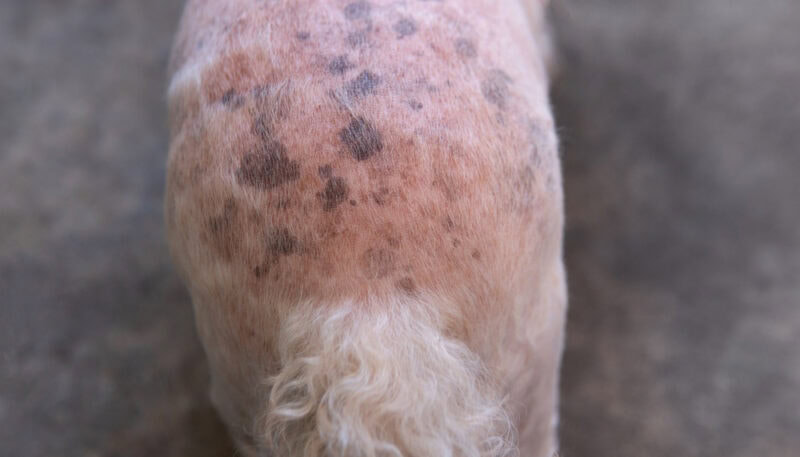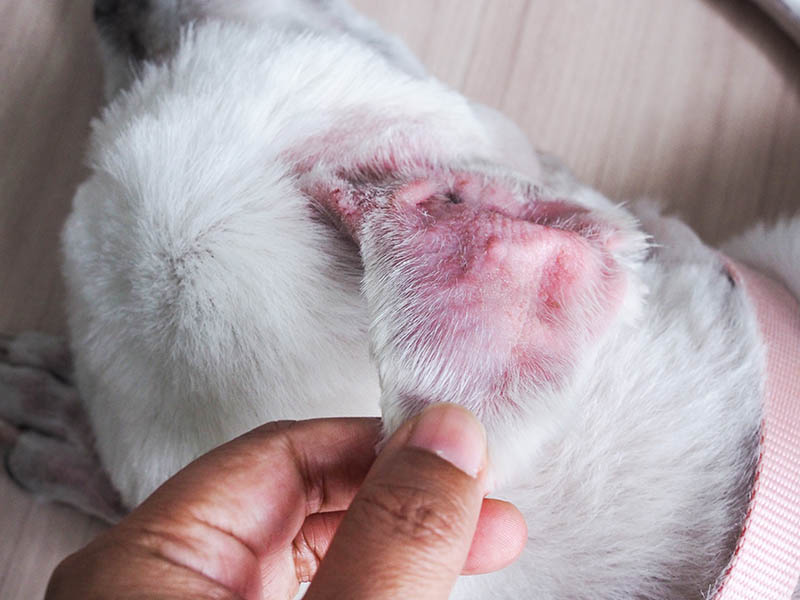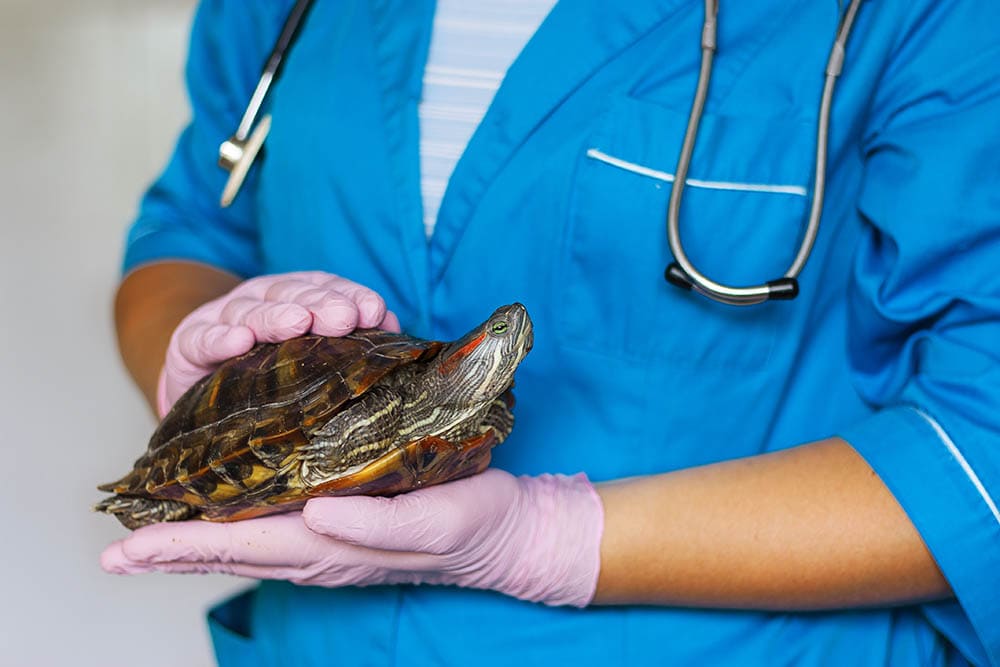VET APPROVED

The information is current and up-to-date in accordance with the latest veterinarian research.
Learn more »Click to Skip Ahead
Your pet’s health is paramount, and while you may do your best to protect them, unexpected illnesses and congenital disorders can arise. But since vet visits and medical procedures are expensive, insurance coverage is designed to offset some of these costs while offering financial protection and peace of mind.
Each year, pet insurance policyholders make thousands of claims due to myriad reasons, although some reasons appear more than others. Premiums are generally inexpensive, and for as little as $25–50 per month, many policies will pay out up to $5,000 per year.
While looking at how pet parents use their policies and how much it saves them, let’s examine the most common pet insurance claims.

The 7 Most Common Pet Insurance Claims
1. Skin Problems
Skin disorders in pets are more common than you may think, and the odds are that your pet will end up with at least one of these conditions during their life. However, with the correct vet care, these are treatable, although some can prove chronic and lead to multiple vet clinic visits.
Causes of skin problems in pets include different types of allergies, which can become a chronic issue that requires ongoing management. Atopic dermatitis is caused by hypersensitivity to indoor or outdoor allergens like dust mites, grass, mold spores, and trees, which causes your pet to constantly lick and scratch.
For furry pets like cats and dogs, their ears and feet are one of the most affected areas, and they’ll present with otitis, redness, and crusting. Hot spots are caused by various skin irritants, and these problems get exacerbated if your pet scratches or bites the itchy sores and scabs.
Not only do skin issues cause a lot of discomfort and pain for your pet, but they can also lead to additional complications if not attended to immediately. On average, the medical cost of treating skin problems is less than $1,000, but chronic conditions require multiple vet visits and higher treatment bills.

2. Gastrointestinal Problems
The second most common problems that necessitate pet insurance claims are digestive problems, and while there are numerous types, some are more frequent than others. Often, it’s because your pet has eaten something they shouldn’t have, especially table scraps or garbage.
Pancreatitis is a serious condition that often requires hospitalization. Other issues include different viruses and bacteria causing infectious gastroenteritis.
Care for GI problems requires veterinary intervention when signs are severe or persist for more than 24 hours. Pets usually need dietary modification and different types of drugs, sometimes hospitalization is required, and diagnostic tests may include blood and fecal tests, and imaging such as radiographs or ultrasound. The average cost of gastroenteritis is $614.
3. Ear Infections
Ear infections are a common part of pet insurance claims. Causes of these ailments include otitis externa, otitis media, and otitis interna, which, if left to persist, can cause permanent damage.
Inner ear infections may also affect your pet’s balance, which potentially messes up their ability to walk. Treatment can cost hundreds of dollars. If left untreated, an aural hematoma may develop, which requires surgical treatment, increasing the costs considerably.
The average cost of treating pet ear infections includes $280 for acute otitis externa.

4. Urinary Tract Infections or UTIs
Both cats and dogs are susceptible to suffer from lower urinary tract infections. UTIs refer to bacterial infections that typically affect the lower urinary tract, the bladder, and the urethra. Infections can also occur secondarily to other chronic conditions such as hyperadrenocorticism or Cushing’s disease, chronic kidney disease, or diabetes mellitus.
UTIs are treated with antibiotics, but factors such as a pet’s age, species, and type of bacteria, along with how long the infection has prevailed or recurred, will affect the duration of treatment. The average cost of treating UTIs in pets is around $500.

5. Kidney Problems
While kidney issues can occur because of another medical condition or its complications, cats are more prone than other pets. Often, your pet will exhibit signs during their mature years.
In most cases, kidney problems are chronic, which means your pet will undergo treatment or management for life after diagnosis. This often includes dietary changes and different medications. Regular monitoring is key to detecting any complications or worsening of the condition.
The total cost of kidney problems can be high; it can be thousands of dollars in the management and treatment of complications over your pet’s lifespan. Routine treatment may include diet and different drugs, while emergency treatment during a crisis can include intravenous (IV) fluid therapy, assisted feeding, blood electrolyte levels modification, and symptomatic treatment to reduce gastrointestinal issues or vomiting.
Additionally, your pet may require blood pressure management or treatment for anemia.
6. Accidental Injuries
The typical temperaments of pets, especially young ones, make them susceptible to accidents that cause bite wounds, road traffic accidents, and lacerations. These are the top incidents for which pet parents of puppies and kittens make insurance claims, along with back leg fractures in cats.
Pets tend to get into all manner of scuffles with other animals, including wildlife, when playing or spending time outdoors. Bite wounds and lacerations may need minimal medical intervention, but serious gashes will require stitches, antibiotics, and pain medication to prevent inflammation or infection.

7. Dental disease
Some pets, and especially dogs, are more prone to cancer than others, and you must monitor your pet’s health and behavior or take them for regular screening. Breeds like Golden Retrievers are shown to have a 61% prevalence of dying from the disease, but early detection improves chances of survival.
The most common form of cancer in dog and cat pets is histiocytosis, which is a skin disease resulting from white blood cell over-proliferation in the bone marrow. Besides skin tumors, there are mammary gland or breast cancer, lymphomas, head and neck lumps, abdominal and testicular, along with bone cancers.
Tumors or neoplasia in pets can be malignant or benign, and at some stage, one in four dogs develops such cancers. Signs of pet cancer include difficulty eating and breathing, abdominal swelling, bleeding from body openings, discolored skin, lumps and bumps, and non-healing wounds.

Significance of Pet Insurance

Most pets are energetic critters that always get injured or infected by diseases as they mature and grow, or when they age into seniors. There are also typical congenital or genetically inherited ailments that show up during your pet’s lifespan, along with emergencies that require expensive medical procedures.
Veterinary care has advanced over the last 10 years, with human medical discoveries inspiring diagnostic testing and technological innovation. Some procedures were once a pipe dream for pet parents, but now they increase the quality and span of life for all manner of animals.
These procedures include advanced allergy testing, chiropractic care, knee and joint replacements, and minimally invasive cancer surgeries. However, with these amazing advances comes a rise in vet and medical costs, which bear down on pet parents as heavier financial burdens.
If you're concerned about potential healthcare costs for your new pet, you may want to look into pet health insurance. Companies like Spot offer balanced, customized plans to suit any breed.
Thanks to pet insurance, owners can comfortably manage the cost of medical care and maintain the health of their pets. Insurance claims data from highly reputable coverage providers shows the type of incidents for which pet parents make the most claims.

Final Word
Pets get to use their insurance policy for different ailments, but the most common claims are for digestive issues and skin diseases. Ear infections, kidney problems, and UTIs also make up a significant number of policy claimants, especially for cat and dog owners.
Pet insurance helps pay for part or the entire price of treating the various diseases, injuries, complications, and congenital disorders covered. It helps save on the unexpected cost of vet visits, especially for emergencies and common health issues where coverage is flexible.
- https://www.dvm360.com/view/pet-insurance-company-reports-most-common-veterinary-visits
- https://www.petmd.com/dog/care/dog-breeds-prone-ear-infections
- https://www.vet.cornell.edu/departments-centers-and-institutes/cornell-feline-health-center/health-information/feline-health-topics/feline-diabetes
- https://fetchacure.org/resource-library/facts/
- https://www.aspcapetinsurance.com/resources/top-pet-insurance-claims-puppies-and-kittens/
- https://www.consumersadvocate.org/pet-insurance
Featured Image Credit: Robert Kneschke, Shutterstock










